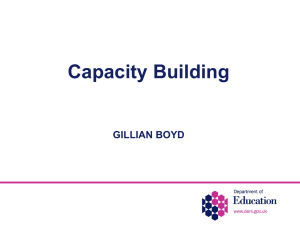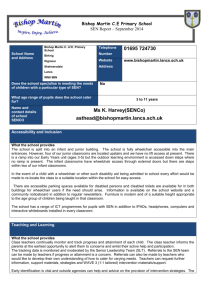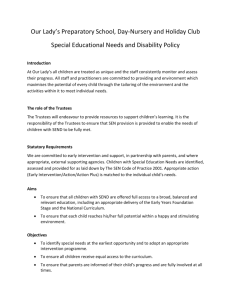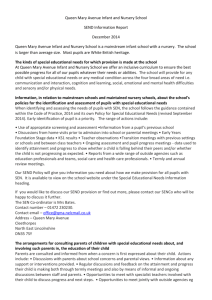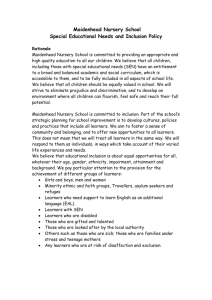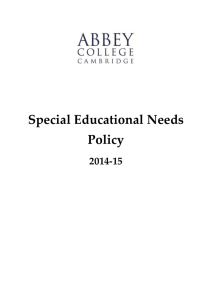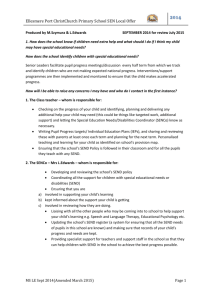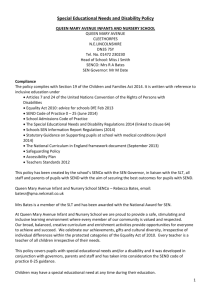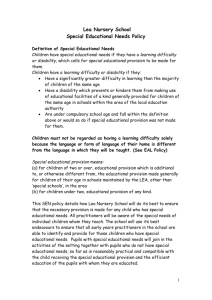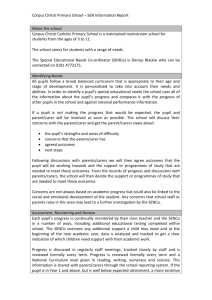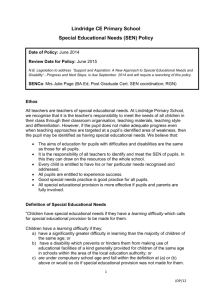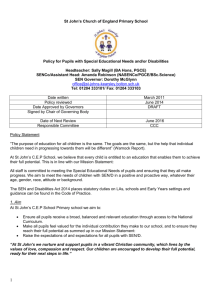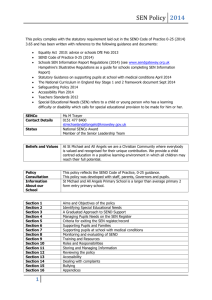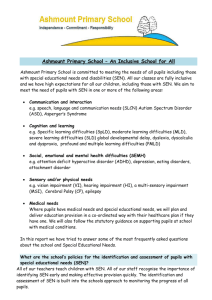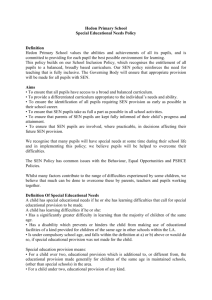Special Educational Needs & Disabilities Policy
advertisement
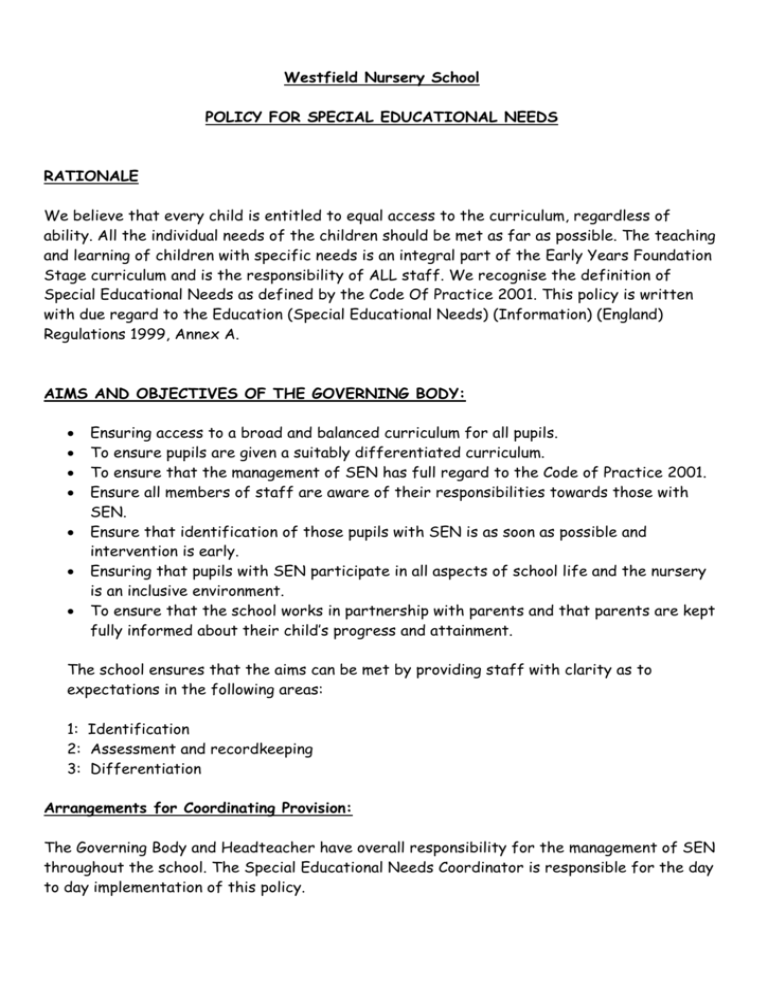
Westfield Nursery School POLICY FOR SPECIAL EDUCATIONAL NEEDS RATIONALE We believe that every child is entitled to equal access to the curriculum, regardless of ability. All the individual needs of the children should be met as far as possible. The teaching and learning of children with specific needs is an integral part of the Early Years Foundation Stage curriculum and is the responsibility of ALL staff. We recognise the definition of Special Educational Needs as defined by the Code Of Practice 2001. This policy is written with due regard to the Education (Special Educational Needs) (Information) (England) Regulations 1999, Annex A. AIMS AND OBJECTIVES OF THE GOVERNING BODY: Ensuring access to a broad and balanced curriculum for all pupils. To ensure pupils are given a suitably differentiated curriculum. To ensure that the management of SEN has full regard to the Code of Practice 2001. Ensure all members of staff are aware of their responsibilities towards those with SEN. Ensure that identification of those pupils with SEN is as soon as possible and intervention is early. Ensuring that pupils with SEN participate in all aspects of school life and the nursery is an inclusive environment. To ensure that the school works in partnership with parents and that parents are kept fully informed about their child’s progress and attainment. The school ensures that the aims can be met by providing staff with clarity as to expectations in the following areas: 1: Identification 2: Assessment and recordkeeping 3: Differentiation Arrangements for Coordinating Provision: The Governing Body and Headteacher have overall responsibility for the management of SEN throughout the school. The Special Educational Needs Coordinator is responsible for the day to day implementation of this policy. Named Member of Staff Mrs Kathy Noon/Mrs Karen Puddefoot are the Special Educational Needs Co-ordinators. Mrs Anstey is the named SEN Governor. Admission Arrangements: Please refer to school’s admission policy. Specialist Provision: Nursery runs a Nurture/Speech and Language Group, each week. These groups are flexible and are adjusted according to need, on a termly basis. Facilities for Inclusion: The school is equipped with two ramps and one disabled toilet. The open plan design of Westfield allows adaptability for all children to have access to all inside and outside areas of the building. This policy reinforces the need for teaching that is fully inclusive. IDENTIFICATION, ASSESSMENT AND PROVISION How needs are Identified, Determined and Reviewed: Information may have been received from the child’s previous setting regarding specific needs. To assess which pupils have particular needs, evidence is obtained by teacher/NN observation. An S.E.N. staff meeting is held at least once per term. All children who are on the S.E.N. list are reviewed and their progress discussed. Any further action will then be decided upon. Staff are then invited to discuss new children who may need to be added to the S.E.N. list. The school adopts a graduated response to meeting SEN. If a pupil is known to have SEN when he/she arrives at the school, the SENCo and class teacher will meet with the parents and any involved advisors/professionals, to determine any extra support and/or adaptions to routine or equipment, that may be required. Ongoing observation and assessment provides feedback about pupil achievements to inform future planning. When teachers have identified pupils with particular needs they will refer to the SENCo directly, or discuss at the next S.E.N. staff meeting. Early Years Action: Provision will be made in collaboration with pupils and their parents at this point. An IEP will clarify what form this provision might take, and targets for the pupil. The class teacher, in conjunction with the SENCo, will formulate IEPs. Progress should be monitored each term, by way of a meeting with parents and relevant staff. At Early Years Action, the SENCo may support the assessment of the pupil, assisting in planning future support and monitoring action taken. Class teachers will remain responsible for planning and delivering individualised programmes. The SENCo may provide support through the use of different learning materials or introduce individual or small group support using a TA. It may also be appropriate to introduce further staff development. External agencies may be consulted to provide effective Inset support for staff. Where the pupil makes progress, support will be gradually reduced as appropriate for individual need. Early Years Action Plus This is characterised by the involvement of external agencies and will follow a request by the SENCo/Headteacher for help in consultation with colleagues and parents. This is likely to occur following an IEP review. External agencies may provide more specialist assessments, give advice on the use and application of new or specialist strategies or materials, and may advise on fresh targets. The school will provide these services with the records which identify strategies already employed and targets already set and achieved. Early Years S.E.N. Funding or Statutory Assessment When a child has identified and specific needs that require additional support, the staff in conjunction with external agencies, may request Early Years S.E.N. Funding. It may also be appropriate or necessary to apply for Statutory Assessment, when additional support will be required to continue after transfer to Lower School/Special School. In all cases the Nursery will provide the LA with all collated S.E.N. information and records, including IEP’s. Arrangements for providing access to a broad and balanced curriculum: Pupils may have access to small group work during the session which targets their specific needs. They may also be withdrawn from ‘together time’ for small group or 1:1 support. Nurture Group Children who are on the SEN list are usually included in one or other of our ‘Nurture Group’ sessions. These sessions are tailored to the needs of the children currently on our SEN list and may focus on any of the following: Speech and Language, P.S.E.D skills, Speech and Language related to EAL, Play skills and language development for children with general developmental delay. These sessions are held on a weekly basis. How the Governing Body evaluates the success of the education provided: The named SEN governor carries out visits to observe the SEN procedures. Complaints: See school’s complaints policy. Use of teachers and facilities outside the school: The school has access to a variety of outside support agencies. The role of parents of pupils with SEN: The school endeavours to engage parents with every aspect of the child’s provision. Parents have the opportunity to liaise often with class teachers, SENCo and Headteacher. Links with other schools: Opportunities are given for staff of transferring lower schools to visit pupils in nursery and discuss their needs with the teacher/SENCo. Where appropriate, provision is also made for SEN pupils to make a series of integration visits to their new school within their final term at Westfield. Links with health services/social services/educational welfare services: When necessary, the Nursery refers children to the Edwin Lobo Centre. Members of staff are often able to attend assessments to support children and their parents. The Nursery also has close links with the Early Years Support Service and our attached Educational Psychologist. Reviewed March 2012





